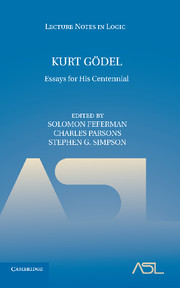Book contents
- Frontmatter
- Contents
- Introduction
- GENERAL
- PROOF THEORY
- Gödel and the metamathematical tradition
- Only two letters: The correspondence between Herbrand and Gödel
- Gödel's reformulation of Gentzen's first consistency proof for arithmetic: The no-counterexample interpretation
- Gödel on intuition and on Hilbert's finitism
- The Gödel hierarchy and reverse mathematics
- On the outside looking in: A caution about conservativeness
- SET THEORY
- PHILOSOPHY OF MATHEMATICS
Gödel on intuition and on Hilbert's finitism
Published online by Cambridge University Press: 04 August 2010
- Frontmatter
- Contents
- Introduction
- GENERAL
- PROOF THEORY
- Gödel and the metamathematical tradition
- Only two letters: The correspondence between Herbrand and Gödel
- Gödel's reformulation of Gentzen's first consistency proof for arithmetic: The no-counterexample interpretation
- Gödel on intuition and on Hilbert's finitism
- The Gödel hierarchy and reverse mathematics
- On the outside looking in: A caution about conservativeness
- SET THEORY
- PHILOSOPHY OF MATHEMATICS
Summary
There are some puzzles about Gödel's published and unpublished remarks concerning finitism that have led some commentators to believe that his conception of it was unstable, that he oscillated back and forth between different accounts of it. I want to discuss these puzzles and argue that, on the contrary, Gödel's writings represent a smooth evolution, with just one rather small double-reversal, of his view of finitism. He used the term “finit” (in German) or “finitary” or “finitistic” primarily to refer to Hilbert's conception of finitary mathematics. On two occasions (only, as far as I know), the lecture notes for his lecture at Zilsel's (Gödel [*1938a]) and the lecture notes for a lecture at Yale (Gödel [*1941]), he used it in a way that he knew—in the second case, explicitly—went beyond what Hilbert meant.
Early in his career, he believed that finitism (in Hilbert's sense) is openended, in the sense that no correct formal system can be known to formalize all finitist proofs and, in particular, all possible finitist proofs of consistency of first-order number theory, PA; but starting in the Dialectica paper Gödel [1958], he expressed in writing the view that ε0 is an upper bound on the finitist ordinals, and that, therefore, the consistency of PA, cannot be finitistically proved. Although I do not understand the “therefore” (see §8 below), here was a genuine change in his views.
- Type
- Chapter
- Information
- Kurt GödelEssays for his Centennial, pp. 88 - 108Publisher: Cambridge University PressPrint publication year: 2010
- 7
- Cited by

